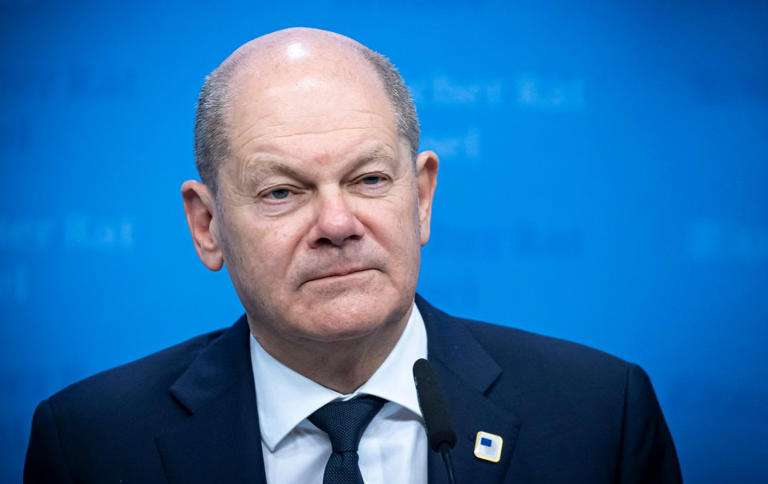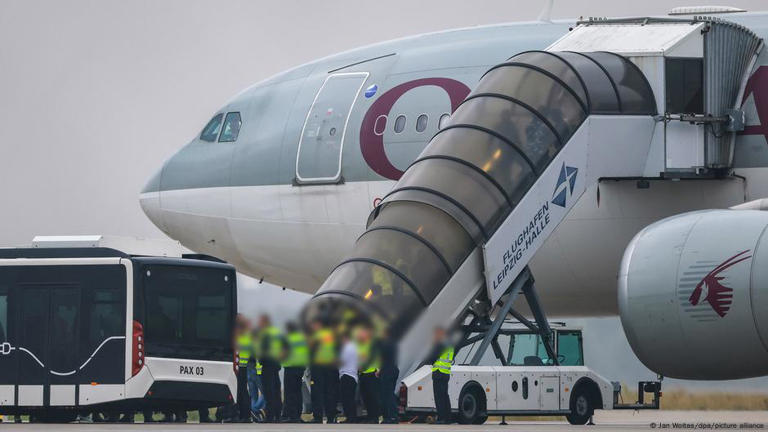Germany has resumed deportations of Afghan nationals, sending 81 of them to their homeland today, Friday, July 18, 2025.
It marked the second time that Germany has done so since the Taliban returned to power and the first since a new government pledging a tougher line on migration took office in Berlin.
It was the first of such flight conducted by the new German government under Chancellor Friedrich Merz.

The government has said that it aims to deport more people to Afghanistan after having held talks with the Taliban government, which Berlin does not officially recognize.
The German Interior Ministry confirmed the repatriation flight in a statement, saying that a flight took off Friday morning carrying 81 Afghans, all of them men who had previously come to judicial authorities’ attention.
It said in a statement that the deportation was carried out with the help of Qatar. It added that the Afghan nationals were deported as part of a collective repatriation effort.
“These are Afghan men who are legally required to leave the country and who have a criminal record in the past.
“The Federal Government is thus implementing an important agreement in the coalition agreement. This stipulates that deportations to Afghanistan will also be carried out, starting with criminals and those who pose a threat.”
German Interior Ministry
More than 10 months ago, Germany’s previous government deported Afghan nationals to their homeland for the first time since the Taliban returned to power in 2021. Then-Chancellor Olaf Scholz vowed to step up deportations of asylum-seekers.

Germany had stopped deportations to Afghanistan and closed its embassy in Kabul following the Taliban’s return to power in 2021.
However, expulsions resumed last year for the first time since the Taliban came to power, when the previous government of Social Democrat Chancellor, Olaf Scholz expelled a group of 28 Afghans convicted of crimes.
Germany has been criticized for its plans to deport people to Afghanistan in spite of the human rights violations being recorded there. The talks between Berlin and the Taliban have also been seen as controversial.
New Chancellor Friedrich Merz made tougher migration policy a central plank of his campaign for Germany’s election in February.
Just after he took office in early May, the government stationed more police at the border and said some asylum-seekers trying to enter Europe’s biggest economy would be turned away. It also has suspended family reunions for many migrants.
Meanwhile, German Interior Minister, Alexander Dobrindt said that an entry and residence ban would also be imposed on the deportees.
“This is how we begin to implement another part of the policy change from the coalition agreement.”
“Deportations to Afghanistan must continue to be carried out safely in the future. There is no right of residence for serious criminals in our country.”
Alexander Dobrindt
The Afghans received up to €1,000 (about $1,160) in cash from the federal states to cover their initial expenses upon their return.
This sum was said to ensure legal certainty for the operation because Germany’s Federal Administrative Court says a deportation can be blocked if a returnee is threatened with immediate destitution.
Amnesty International Slams Afghan Nationals’ Deportation
However, Human rights group, Amnesty International strongly criticised the renewed deportations to Afghanistan saying that the situation in the country was “catastrophic.”
The group said in a statement that extrajudicial executions, enforced disappearances, and torture are “commonplace.”
A debate over resuming expulsions has flared as migration has risen up the political agenda in tandem with the rise of the far-right Alternative for Germany (AfD) party.
The Afghan nationals’ flight took off hours before German Interior Minister, Alexander Dobrindt meets his counterparts from five neighboring countries — France, Poland, Austria, Denmark and the Czech Republic — as well as the European Union’s Commissioner responsible for migration, Magnus Brunner.
Dobrindt is hosting the meeting to discuss migration on the Zugspitze, Germany’s highest peak, on the Austrian border.
READ ALSO: Non-Oil Sector Emerges as Ghana’s Secret Weapon for Long-Term Stability























